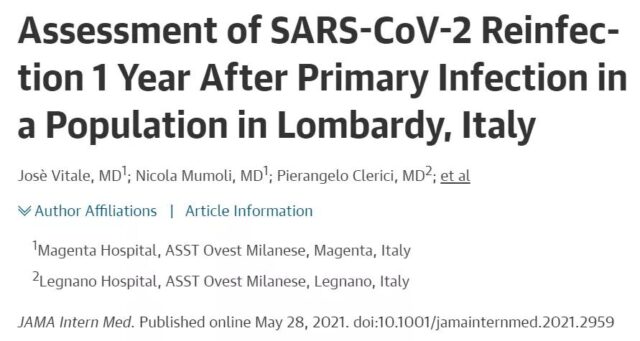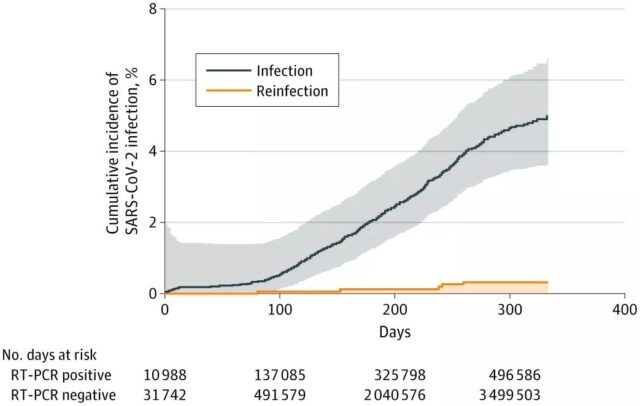JAMA: Immunity generated by COVID-19 infection can last for at least 1 year
- Normal Liver Cells Found to Promote Cancer Metastasis to the Liver
- Nearly 80% Complete Remission: Breakthrough in ADC Anti-Tumor Treatment
- Vaccination Against Common Diseases May Prevent Dementia!
- New Alzheimer’s Disease (AD) Diagnosis and Staging Criteria
- Breakthrough in Alzheimer’s Disease: New Nasal Spray Halts Cognitive Decline by Targeting Toxic Protein
- Can the Tap Water at the Paris Olympics be Drunk Directly?
JAMA: Immunity generated by COVID-19 infection can last for at least 1 year
JAMA: Immunity generated by COVID-19 infection can last for at least 1 year. Recent studies have shown that patients who have been infected by the COVID-19 virus can stimulate a strong immune response after receiving a dose of the COVID-19 vaccine, and also have a strong ability to neutralize the newly emerging COVID-19 mutant virus strain.
COVID-19 vaccination has been widely carried out all over the world, and for people who have been vaccinated with the COVID-19 vaccine, how long the immune protection it can provide is an open question. At present, the follow-up time for vaccinators is still relatively short. However, we can also find clues about the durability of immunity from recovered patients who have been infected by the new coronavirus.
A few days ago, a real-world study published in JAMA Internal Medicine, a sub-issue of the Journal of the American Medical Association, has brought good news. Patients who have recovered after being infected with the new coronavirus may have immunity in their bodies for at least one year.

The durability of immunity has many aspects. Current research shows that the level of neutralizing antibodies triggered by vaccination or new coronavirus infection can last for about a few months, and then gradually decline.
However, the human body’s immune response also includes stimulating the production of B cells and T cells capable of recognizing new coronavirus antigens. Some of these cells will be transformed into memory B cells and T cells, which quickly stimulate an immune response when the virus invades again.
A previous study published in the journal Nature also showed that patients with mild new coronavirus infections still have immune cells producing protective antibodies in their bodies 11 months after infection, providing evidence for long-term immune protection.
So, can these immunological evidences be transformed into real- world protection for vaccinators or patients recovering from COVID-19?
In this study, published in JAMA Internal Medicine, Italian researchers analyzed data from patients who tested positive for COVID-19 in the Lombardy region of Italy from February 2020 to February 2021.
This analysis includes not only data from patients with positive nucleic acid tests for the first time, but also data from patients with secondary infections.
Researchers define a secondary infection as a second nucleic acid test at least 90 days after the first nucleic acid test is positive, aiming to rule out positive tests due to the new coronavirus that has not been completely eliminated.
Research data shows that of the 13,496 people whose initial nucleic acid test was negative, 528 (3.9%; 95% CI, 3.5%-4.2%) were infected with the new coronavirus during the follow-up period. Among the 1579 patients whose first nucleic acid test was positive, 5 patients (0.31%; 95% CI, 0.03%-0.58%) developed secondary infections.
Of these 5 patients with secondary infections, only one needs to be hospitalized. And 4 of them work in the hospital or need to go to the hospital frequently for treatment, so the risk of re-exposure to the COVID-19 virus is higher. Secondary infection usually occurs long after the first infection is over, and the time interval between two infections is more than 230 days on average.

Accumulation curve of cases of first infection (black) and second infection (orange) (picture source: reference [2])
Researchers’ analysis of the accumulation curve of the first infection and the second infection shows that the second infection is still a very rare phenomenon. In the discussion section of the article, the researchers said that the protective effects of natural infections seem to last for at least one year.
However, the researchers also said that this study ended before the newly emerged COVID-19 virus began to spread. It is not clear how strong the immunity brought about by natural infections is against the COVID-19 virus.
A review article published in the same period pointed out that these data do not mean that patients who have been infected by COVID-19 can not be vaccinated. Recent studies have shown that patients who have been infected by the COVID-19 virus can stimulate a strong immune response after receiving a dose of the COVID-19 vaccine, and also have a strong ability to neutralize the newly emerging COVID-19 mutant virus strain.
The author of the review article, Dr. Mitchell H. Katz of NYC Health and Hospitals, said that COVID-19 vaccination may provide broader protection against COVID-19 mutant virus strains than natural infections.
Therefore, it is still recommended that everyone receive the COVID-19 vaccine regardless of whether they have been infected by the COVID-19 virus.
(source:internet, reference only)
Disclaimer of medicaltrend.org
Important Note: The information provided is for informational purposes only and should not be considered as medical advice.



